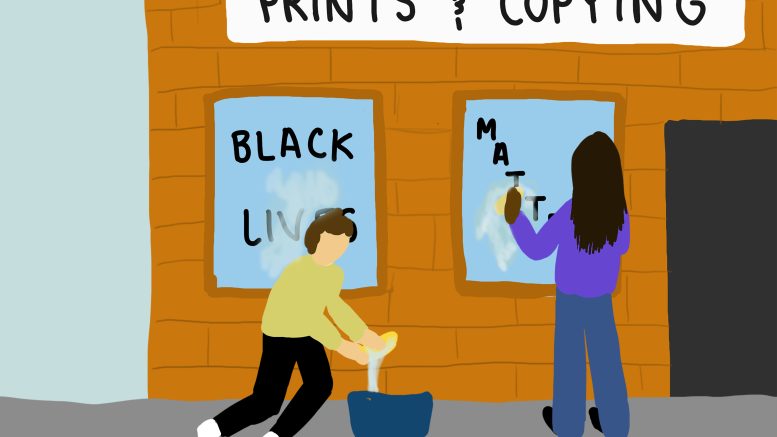George Floyd’s death in May 2020 sparked countless Black Lives Matter protests and rallies around the world, including here in Winnipeg, and there was no doubt in my mind that I was going.
The night before the Winnipeg protest, my sister and I bought posters and spent hours using our limited creativity to think of what to write. The next day, some of my friends gathered at my house and we made more posters, loaded the car and set off to the legislative building to scream for our rights.
I was fully prepared to attend a protest of 100 people or fewer. To my surprise, thousands of Winnipeggers came out to the Justice 4 Black Lives rally. This was shocking to me, since there has not been a time in my life when I have seen people in Winnipeg show solidarity with Black people more than this.
It was a heartfelt moment that I and everyone in the car with me felt in the air. However, the moment quickly went away when a white lady in front of us with an interchangeable “Justice for George Floyd” and “All Lives Matter” poster was publicly ousted from the crowd. Clearly, not everyone was there for the right reasons, but for that brief moment I was proud of us and our progress.
It has been nearly three years since that rally.
Since then, black squares have been deleted from Instagram feeds, stickers have been taken down, signs have been discarded, protest posters have been lost to time, “BLM” and linktrees have been scrubbed off bios and just like that, the performances were over.
Looking back, that’s what the support for Black Lives Matter was — a performance. Those international protests resulted in a heap of promises that intended to address systemic racism. However, three years later it seems like not much has changed.
After Prime Minister Justin Trudeau took a knee and did his little photo op around the Parliament Hill Black Lives Matter rally, the Parliamentary Black Caucus, a group that consists of MPs and senators, issued a letter to the government that included 44 calls to action addressing racism. Trudeau, obviously, embraced these recommendations and said he would work alongside the caucus to identify how to proceed.
The 44 calls to action fell under five categories: supporting Black-owned businesses, police and justice reforms, investing in Black artists and culture, collecting disaggregated, race-based data and diversifying the public sector.
About a year after the protests, CBC News did a full analysis of the federal government’s actions done to address and combat anti-Black racism. According to the CBC, the government had made progress, budgetary allocations or bill proposals related to 24 out of the 44 calls to action by Aug. 1, 2021.
Despite this, racially-motivated police brutality persists.
For instance, a Black University of Toronto student is currently suing the Toronto police, alleging that in 2021 he was unlawfully stopped on his way to school by three Toronto police officers who tackled him, placed a knee on his neck — the same action that killed George Floyd — and tasered him repeatedly.
Although some Canadians believe that police brutality only affects our American neighbours, this is not the case. A 2020 report from the Ontario Human Rights Commission found that Black Canadians accounted for 32 per cent of all those charged by police in Toronto from 2013 to 2017, despite making up less than nine per cent of the city’s population.
Racism in policing is a problem that still affects Black Canadians today. Released last summer, an analysis of race-based data gathered by Toronto police in 2020 found that Black people are 2.2 times more likely to have police encounters and are 1.6 times more likely to have force used against them during these encounters. The police chief himself expressed regret over the report’s findings and vowed to combat systemic racism in the force.
While there isn’t much data available about anti-Black racism in Winnipeg policing, we still have a problem of race-based police violence here. The CBC compiled data about those who died or were killed during police encounters between 2000 and 2017, and found that although Indigenous peoples made up 10.6 per cent of Winnipeg’s population during that time, over 60 per cent of people killed during police interactions in Winnipeg were Indigenous.
Apologies, empty gestures and hollow promises do nothing for Black people except make their eyes roll. Actual police and justice reform is necessary to fix the underlying systemic racism that plagues the lives of Black people and other people of colour.
When will changes be implemented to protect the well-being of Black bodies? When will we finally stop seeing the words Black, dead and police officer in the same recurring headlines? We all believed that enough was enough three years ago, but when will we finally see actual change?


